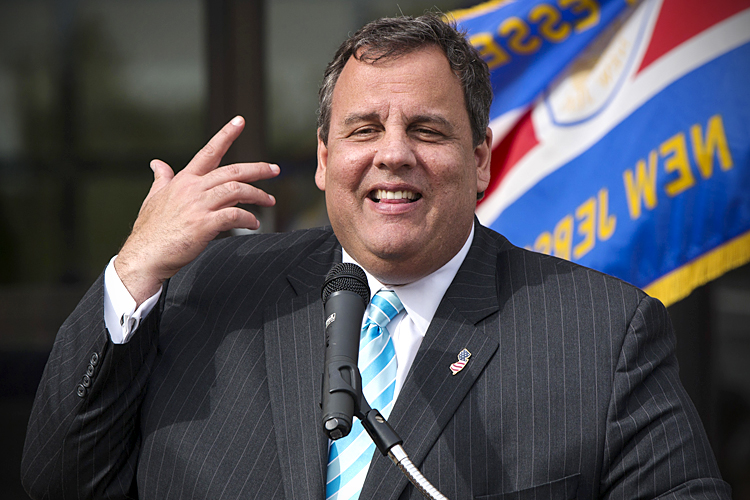Chris Christie is probably running for president in 2016. He is probably one of the “favorites.” The donor class loves him so much they begged him to enter the race in 2012. He is cruising to an easy reelection in a very blue state with the support of a surprising number of Democratic donors. Despite the apparent cross-partisan appeal, he has also been a right-wing folk hero, primarily for his “viral” videos in which he yelled at government employees. Christie polls well in New Hampshire, and leads nationally in some polls. There is just one small problem, though: He is already the candidate Republican voters hate the most.
That’s what Rasmussen’s latest poll says. Twenty-one percent of Republicans nationwide say they’d vote for Christie to be their nominee in 2016. But when asked who they least wanted to be the nominee, 31 percent of Republicans said Christie. Hillary Clinton has a similar problem among Democrats, but her yeses at least outweigh her negatives. How did this happen to Christie, exactly? The simple answer is that he’s too good at what he does, and what he does is hide his conservatism behind a mask of reasonableness.
One (particularly vile) segment of the right hates him for one of Christie’s unambiguously admirable acts: standing up to virulent Islamophobia. Unfortunately, virulent Islamophobia is very, very popular on the right, tolerated at the highest levels and encouraged by even the most respectable media outlets of the conservative movement. Mitt Romney counted John Bolton, ally of raving anti-Muslim loons Pamela Geller and Robert Spencer, as a “foreign policy adviser. “Shariah law” hysteria has taken hold at Republican-run legislatures across the nation. These people are prepared to go to war to prevent Christie from being the nominee. They will (and have) essentially call him a terrorist sympathizer.
Daniel Pipes and Steve Emerson wrote of “Chris Christie’s Islam Problem” in the National Review. The odious Robert Spencer declared Christie “a foursquare tool of jihadists and Islamic supremacists.”
Christie does have some cover: The neoconservatives, including some marginally less-extreme Islamophobes, have adopted him and are instructing him in the ways of their ultra-hawkish foreign policy. The Washington Post’s Jennifer Rubin rather suddenly likes him a great deal. This is the source of the entire Christie/Paul fight.
But naked Islamophobia is populist in a way that neoconservative interventionism decidedly isn’t. A sort of generalized paranoia about Muslims in general — and a desire to keep them out of the United States — is broadly popular among scared old white conservatives. Actual wars, though, even conservatives are tired of. As the 2012 race began, polls showed conservatives and Republicans feeling much less excited about interventionism than they were during the Bush years. Forty-five percent of Republicans said the U.S. should “mind its own business internationally.” So Christie wins no points from conservatives for sounding like Bill Kristol, and loses points for not sounding like Geert Wilders.
Similarly, the right has not forgotten Chris Christie’s post-hurricane embrace of President Obama. The words “Benedict Arnold” have been thrown around. Conservative commentators of varying prominence explicitly blamed Christie for Obama’s reelection. That sort of talk largely came from the less “respectable” voices of the conservative movement, but the conservative base hates and distrusts anything “respectable.” Dick Morris may be a fool, but he’s a fool with a massive audience that does not know he’s a fool.
The ironic thing about this conservative distrust is that Christie actually would be a very conservative president. He’s an antiabortion and anti-gay marriage staunch Catholic who believes in low taxes and no regulations and all the rest of the important, eternally unchanging policies on the checklist. Christie’s branding is designed to make him attractive to moderates in the Northeast — this is how the press fell in love with him, obviously — but it’s just that: branding. On the issues, he’s a man solidly of the right.
So, like Jon Huntsman before him, Christie blinds both conservatives and center-lefties to how conservative he actually is. That didn’t work out so well for Jon Huntsman.
Mitt Romney, it’s true, was not particularly beloved by the Republican base. But none of his primary opponents were remotely serious enough to deny him the nomination, especially with his massive organizational and financial advantages. In 2016, Christie will probably have to contend with less ridiculous opponents, with stronger support.
Nate Cohn, who is much smarter than I am, “says it is surprisingly easy to envision Christie winning the nomination.” That’s still true: All the money people do love him a lot. But if the divide between what the money people in the conservative movement want, and what the raging base wants, grows between now and 2016, Christie will find himself on the side with far fewer Republican primary voters.

